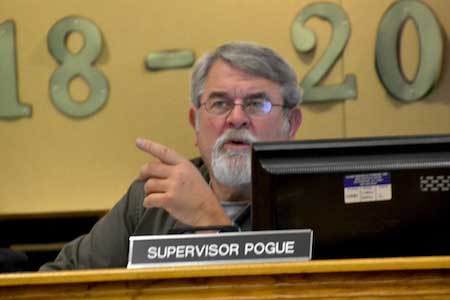Barre officials want 80% of revenue from turbine project, far more than in usual PILOT

Photo by Tom Rivers: Sean Pogue, Barre town supervisor, speaks during Wednesday’s Town Board meeting.
BARRE – The developers of a wind energy project in Barre say the 30-plus turbines would bring at least $1.2 million in revenue to the local governments in the first year of operation, with that total increasing to about $1.8 million in the year 25.
The money would be divvied up among the Town of Barre, Orleans County and Albion school district.
In a normal PILOT (payment of lieu of taxes), the money is split up in a pro-rated manner, to be shared based on the municipalities’ tax rates. The school district tends to get the most money because its tax rate is higher.
Barre town officials want a different revenue-sharing approach with the potential turbine money, where Barre could get as much as 80 percent of the revenue.
That is the position from Sean Pogue, the Barre town supervisor. He favors a Host Community Agreement where the town would get 80 percent of the revenue, with the remaining 20 percent to be shared by the school district and county. (One of the proposed turbines is in the Oakfield-Alabama school district, which could receive an annual payment equal to the average of turbine.)
Representatives from the three taxing entities have met several times, and Pogue said Wednesday the county and school district want a bigger percentage than 20 percent.
The talks are ongoing, and Pogue said the agreement won’t be a normal PILOT. If that was the case, Barre would get 26.8 percent of the revenue, with the county getting 29.0 percent and the school district, 44.1 percent. That is based on the 2019 tax rates – Barre, $9.18, county, $9.96, and school district, $15.10.
Apex Clean Energy is working on an application for 33 wind turbines with a 5.6 megawatt turbine. The negotiations have called for $8,500 to $9,000 per megawatt from Apex, with the company to increase the payments by 2 to 2.5 percent each year.
Pogue said on Wednesday Apex has agreed to $8,900 per megawatt. That adds up to $1,644,720 for 33 turbines with a 5.6 megawatt capacity.
The number would go down if there are fewer turbines or smaller turbines.
If Apex pays $8,900 per megawatt to start, Pogue said the inflation rate to be paid from Apex could be 2 percent more from years 1 to 10, and 2.5 percent from years 11 to 25. If Apex paid $9,000 per megawatt to start, the inflation rate would stay at 2 percent longer – to year 14, then increase to 2.5 percent in years 15 to 25.
“These are just numbers we’re looking at,” Pogue said during Wednesday’s Town Board meeting. “We’re not voting on anything at this time.”
Paul Williamson, Development Manager for Apex’s proposed Heritage Wind, has urged the three entities to “be generous with each other and don’t just try to secure your piece.” He spoke recently to the Orleans Hub.
He said the company is close to finishing its application for the project, which is submitted to the state Department of Public Service and could take two years to review.
Normally, PILOT funds aren’t paid until construction is complete with a project. That could be three or four years from now if the Heritage Wind project is approved.
Williamson and Apex are proposing Barre receive some upfront money before construction starts as part of the Community Host Agreement.
Apex has offered $20,000 for Barre to be paid within 30 days of the signing of the Host Community Agreement. Another $30,000 would be paid on the one-year anniversary of the signing of the HCA. At the commencement of construction, Barre would receive another $200,000, Pogue said.
That is money outside of the HCA and PILOT.
The town supervisor discussed the funds during Wednesday’s board meeting.
“There’s more numbers for you to digest that we can talk about,” he told the board members.
















































































